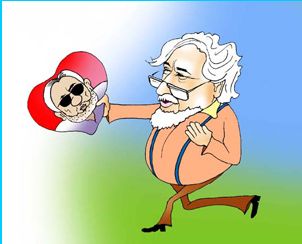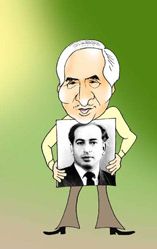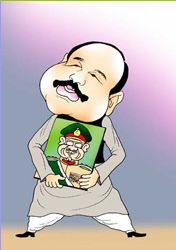The Bold and the Beautiful
By Shimaila Matri Dawood | News & Politics | Published 23 years ago
When it comes to integrity, ethics dictate that snow-white and clean as a whistle is the only way to be. But when it comes to those bastions of integrity, the men and women in whose hands we entrust the future of nations, an Observer columnist said it best: “The first requirement of a statesman is that he be dull.” As a nation, however, which takes pride in doing things differently, we have at the polar end of this spectrum, a host of homespun, beautiful as Joseph’s technicolour coat, Pakistani politicos — who come in as many shapes and sizes as an iridescent chameleon, changing their hues to suit the public mood.
If another Observer writer is to believed, “journalists belong in the gutter because that is where the ruling class throw away their guilty secrets.” So who better to pick ‘the most colourful characters in Pakistan’s political history’ than the who’s who of the Pakistani media — those who engage in the red-hot blood sport of making and shaping the leaders of the nation? The following politicians, known for their marked idiosyncracies, are the personal pick of some of the country’s boldest print men. And judging by the varied responses below, there certainly seems to have been no shortage of candidates to chose from.
Ardeshir Cowasjee
 JAM SADIQ ALI: Blackguard, murderer, grand larcenist (he died before he could be convicted). He was a likeable rogue, who never denied the fact that he was a rogue.
JAM SADIQ ALI: Blackguard, murderer, grand larcenist (he died before he could be convicted). He was a likeable rogue, who never denied the fact that he was a rogue.
Despite all his attributes, he was chosen to be the chief minister of Sindh by President Ghulam Ishaq Khan to serve his nefarious purposes. GIK wished to remain in power for eternity. Jam as CM robbed and plundered again — as he had done during Zulfikar Ali Bhutto’s regime. But this time around he did not kill. Cancer killed him.
He left a very charming Hindu wife, lots of offspring, and lots and lots of moolah.
Khalid Hasan
 There is no question about it, Zulfikar Ali Bhutto was, and remains today, Pakistan’s most charismatic politician. He had a way with crowds and the ability to reach out to them. He changed the style of politics in Pakistan, pulling it out of intrigue-infested backrooms, and bringing it out on the streets of the towns and cities of Pakistan.
There is no question about it, Zulfikar Ali Bhutto was, and remains today, Pakistan’s most charismatic politician. He had a way with crowds and the ability to reach out to them. He changed the style of politics in Pakistan, pulling it out of intrigue-infested backrooms, and bringing it out on the streets of the towns and cities of Pakistan.
He had humour and his timing was superb. He could read popular mood and respond to it. No politician before Bhutto had taken the trouble to travel to the remotest corners of the country. He electrified the people who admired his daring, his courage, his turn of phrase, his youth, and, above all, his rakishness. What other politician, before or after him, could have been cheered for declaring at a jalsa in Lahore, that although he took a drop or two of “that stuff”, he did not drink the blood of the people!
On his feet, he could invent descriptions of his detractors which they could never shake off. He called Asghar Khan an “Aloo” and Khan Abdul Qayyum Khan “Double Barrel Khan”. He once said that the most powerful party in Pakistan was the Army League. How true, even thirty years after Zulfikar Ali Bhutto said it.
Musahid Hussain
 Name: Sayed Pervez Musharraf
Name: Sayed Pervez Musharraf
Current Status: Pakistan’s first Sayed ruler, Shah sahib heads the country’s most formidable political entity which has ruled Pakistan longer than all other politicians and parties. He wears 6 hats:
Four-star General;
Army Chief;
President;
Head of the Pakistan Establishment;
Kingmaker & Dealmaker Extraordinary;
FOB (Friend Of Bush).
Profile:
Greatest Achievement: Demolition Man of the Pakistan establishment’s twin towers: demolishing the myths of a flawed foreign policy and its bye-product, the mullah-military nexus, thereby burying the Zia legacy, and destroying the CSP, the kingpin of the bureaucracy.
Favourite adjective: ‘sincere’
Favourite word: ‘strategy’
Favourite ideology: ‘flexibility’
Biggest minus: Lacks sense of humour
Reasons why he’s the country’s most colourful politician:
1) Dresses imaginatively, combining western-style sartorial elegance with native diversity. This makes him Pakistan’s best-dressed politician (witness the 6 changes of dress in one day at the Agra Summit in July 2001 and the different pugrees during the Referendum campaign in April 2002).
2) Master of the U-Turn
Foreign policy: Ditched the 20-year old doctrine of ‘strategic depth’ in Afghanistan and 13-year- old jihadi Kashmir policy.
Accountability: Come election time, allowed poachers to become gatekeepers, making NAB into Nabeena Accountability Bureau which can ‘see no evil.’
Jihad: Baptised Jaishe Mohammed in January 2000, and 2 years later, in January 2002, banned it for ‘terrorism’.
3) Ability to acquire strange bedfellows as friends.
Current list of buddies is a veritable ‘Who’s Who’ of the Halls of Fame, as well as Infamy:
Israel’s Foreign Minister Shimon Peres said in November 2001 that ‘I never thought that as a good Jewish boy, I will go to bed praying for the long life of the President of Pakistan’;
An assortment of Third Worlders: Iranian radical clerics, conservative Gulf monarchs, communists in China, Stalinists in North Korea, aging revolutionaries in Cuba, military fascists in Burma, Bangladeshi democrats, Arab Baathists, Turkish secularists, not forgetting the good ol’ Taliban fundos.
The ‘gora’ crowd includes the usual suspects: rightwing republicans in the United States, European social democrats, World Bank/IMF wallahs plus the Japanese of course.
4) Outsmarted Pakistani politicians.
His October 12, 1999, coup was welcomed by a diverse ‘fan club’ of Pakistani liberals, democrats, jihadists and fundamentalists — Benazir Bhutto, Nawabzada Nasrullah Khan, Imran Khan, Asghar Khan and Qazi Hussain Ahmed, all of whom ardently believed he was ‘our man’.
5) The establishment’s man with a difference:
Non-establishment tastes include: preference for the poetry of Faiz Ahmed Faiz, revolutionary songs of Iqbal Bano and dining out at ‘khokhas’, admiration for establishment bete noires, Ajmal Khattak, Asfandyar Wali and Rasool Bux Palijo, a Muhajir who is culturally more a Punjabi albeit an English-medium one, a dictator coexisting with a critical press, notwithstanding the occasional authorised thrashing of dissident hacks in the inimitable style of the Punjab Police ‘phhanti’.
6) Good sense of timing
Able to switch and ditch without batting an eyelid, he was the first to realise that Al Qaeda can also be Al Faida.


